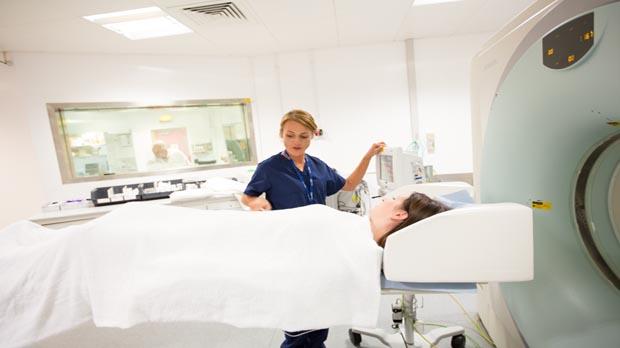
Around 1 in 5 people diagnosed with cancer in the UK take part in a clinical trial.
Please note - this trial is no longer recruiting patients. We hope to add results when they are available.
This trial is comparing a new drug called BEZ235 with everolimus for pancreatic neuroendocrine tumours (NETs). This trial is for people who have pancreatic NETs that can’t be removed with surgery or has spread to another part of the body. Doctors call this an advanced pancreatic neuroendocrine tumour.
Everolimus is a biological therapy. It is a cancer growth blocker. It stops signals that cancer cells use to divide and grow.
BEZ235 is also a biological therapy. It too is a cancer growth blocker. It blocks more signals than everolimus does. The researchers think that BEZ235 may work better than everolimus to treat people with advanced pancreatic NETs.
The aims of this trial are to compare BEZ235 with everolimus to find out
You may be able to enter this trial if
You cannot enter this trial if
 in the past month or had radiotherapy to a small area to control symptoms in the past 2 weeks
in the past month or had radiotherapy to a small area to control symptoms in the past 2 weeks in the past 2 months
in the past 2 monthsThis is an international phase 2 trial. It will recruit 140 people from different countries around the world. It is a randomised trial. The people taking part are put into treatment groups by a computer. Neither you nor your doctor will be able to decide which group you are in.
Half the people will have BEZ235. The other half will have everolimus.

BEZ235 is a powder. You dissolve it in a glass of water or apple juice. You take it twice a day after a light meal.
Everolimus is a tablet. You take it once a day at the same time, with a glass of water.
You can continue treatment as long as it is helping you and the side effects aren’t too bad.
On the days you visit the hospital you cannot eat or drink anything for 12 hours before, apart from water.
As part of this trial, the researchers will ask for a sample of tissue taken when you had surgery, or from a small piece of tissue taken to diagnose your cancer (a  ).
).
They will also ask for another biopsy if you agree and your doctor thinks it is OK. You don’t have to have this biopsy done if you don’t want to. You can still take part in the trial.
You see the doctor to have tests before taking part in this trial. These tests include
 )
) or
or  )
)During treatment you see the doctor every week for 2 months and then once every month. At each visit you have a physical examination and blood tests. You have a heart trace every month and a scan every 3 months.
At the end of treatment you see the doctor for the same tests you had at the beginning.
After treatment you see the doctor every 3 months. If you stopped taking your trial treatment due to side effects, you have a CT or MRI scan until you start another treatment or your tumour starts to grow again.
BEZ235 is a new drug and there may be side effects we don’t know about yet. The most common side effects include
 )
)You cannot eat or drink the juice of grapefruit, Seville oranges or other certain citrus fruits for a week before starting BEZ235 and during treatment.
The most common side effects of everolimus are
Your doctor will talk to you about the possible side effects before you agree to take part in the trial.
We have more information about everolimus in our cancer drugs section.
Please note: In order to join a trial you will need to discuss it with your doctor, unless otherwise specified.
Dr Juan Valle
Experimental Cancer Medicine Centre (ECMC)
National Institute for Health Research Cancer Research Network (NCRN)
Novartis
If you have questions about the trial please contact our cancer information nurses
Freephone 0808 800 4040

Around 1 in 5 people diagnosed with cancer in the UK take part in a clinical trial.